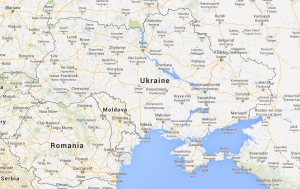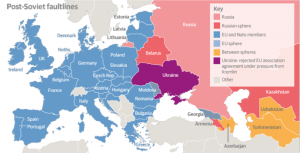
As the debate on Ukraine proceeds in the Commons, I’m once again delighted to discover so much expertise which was hitherto wasted.
Having spoken to Ukrainians protesting outside Downing Street about 10 days ago, I’m grateful that the House of Commons Library has produced this briefing: Ukraine, Crimea and Russia (PDF, 48 pages, 1.443 MB).
From the Summary:
In November 2013, the Ukrainian government of Viktor Yanukovych decided that it would not sign an Association Agreement and a Deep and Comprehensive Free Trade Area agreement with the European Union. Demonstrations ensued in the Ukrainian capital Kiev. The demonstrations, led by pro-Western Ukrainians, lasted through until the new year and then turned violent; many protesters and some security personnel were killed.
On 21 February 2014, a compromise agreement was worked out with the mediation of the French, German and Polish foreign ministers which would have led to the formation of a power-sharing government and early elections in December 2014. However, the next day the temperature of the crisis suddenly rose, Viktor Yanukovych disappeared from the capital and protesters occupied the main public buildings in Kiev. The Ukrainian parliament stripped Yanukovych of his powers and a new government was formed.
On 27 February airports in the Crimean peninsula were surrounded by unidentified military personnel who Western observers said were Russian, although Russia denied this. Military bases in Crimea were surrounded. On 3 March there were rumours of an ultimatum to Ukrainian forces to surrender to the pro-Russian troops. Russian stock markets and the rouble slumped. The supposed ultimatum passed without incident.
Attempts to negotiate a political settlement at talks in Paris on 5 March ended without success and the following day, the Crimean regional parliament asked to join the Russian Federation, setting up a referendum on secession from Ukraine.
The new authorities have been accused by Russia of being led by ‘pogromists’. All attempts to seek a negotiated solution failed and the Russian and Crimean authorities refuse to talk to those in Kiev.
Ukraine is a deeply divided country, politically and economically and there is deep mistrust, rooted not only in a tragic and bloody history in the 20th Century, particularly during the rule of Stalin and during the Second World War, but also in a story of economic failure after independence.
Ukrainian oligarchs are probably more powerful than their Russian counterparts relative to the size of the country, but their role is unclear. Ukraine has a substantial military force, although it would be no match for Russia, but analysts think that Russia would hesitate before attempting an occupation of all of Ukraine.
The Russian government has justified its actions by saying that Russian-speakers in the east of the country are threatened by the ‘fascist-led’ authorities in Kiev, although much of the threat to Russian-speakers is said by observers to be fabricated and the action is difficult to justify legally. On the other hand, the removal of Yanukovych did not comply with the Ukrainian constitution. The present Crimean authorities, who also came to power in dubious circumstances, have collaborated with the Russian government in controlling the media in Crimea and in Russia to present their version of events, both to ensure a pro-secession vote in the referendum and to boost the popularity of the Russian government at home.
Faced with what Western leaders have said is a violation of Ukrainian sovereignty and a serious threat to the international order, the West has agreed on targeted sanctions, drawing up a list of Russian officials associated with the incursion with a view to freezing assets and imposing travel bans and visa restrictions. Diplomatic sanctions such as expelling Russia from the Group of 8 countries appear to have taken place already and Western countries have drafted a resolution at the United Nations Security Council.
The UK government has decided to review all its contacts with the Russian government, including looking again at all arms export licences.
The biggest question is whether Russian forces will go any further and move into the rest of Ukraine. Other countries in Russia’s near abroad are said to be worried about this dramatic escalation of Russian President Vladimir Putin’s policy of re-establishing a privileged sphere of interest.
The map included shows the relevant geopolitical fault lines:

Contains Parliamentary information licensed under the Open Parliament Licence v1.0.